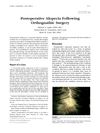TLDR Hair loss can occur after oral surgery, likely due to stress and pressure on the scalp, and usually gets better on its own.
The document reported on two cases of postoperative alopecia, a condition of hair loss that occurred after oral surgery under general anesthesia. The first case involved a 5-year-old girl with hair loss in the occipital region 20 days after surgery, which resolved in 4 months without treatment. The second case was a 19-year-old male who experienced hair loss in the same region about 30 days post-surgery, with spontaneous recovery after 5 months. The paper proposed that the hair loss could be due to perioperative stress and pressure-induced ischemia from head immobilization during surgery. It identified potential risk factors such as long surgery duration, hypotension, blood loss, anemia, hypothermia, and certain headrests. The paper highlighted the need for preventive measures like repositioning the head and avoiding hard gel headrests, as treatments like topical steroids were ineffective.
13 citations
,
November 2015 in “Journal of anesthesia” A woman permanently lost hair on her scalp after a long surgery.
24 citations
,
July 2014 in “British Journal of Anaesthesia” Long surgeries can cause temporary hair loss due to pressure on the scalp.
 9 citations
,
August 2008 in “Journal of Oral and Maxillofacial Surgery”
9 citations
,
August 2008 in “Journal of Oral and Maxillofacial Surgery” A woman experienced temporary hair loss after jaw surgery, which can be reduced by careful head positioning during the operation.
 144 citations
,
July 2002 in “Clinical and Experimental Dermatology”
144 citations
,
July 2002 in “Clinical and Experimental Dermatology” Telogen effluvium is a common type of hair loss that can resolve on its own or become chronic, with treatment depending on early diagnosis.
 January 2026 in “Dermatology and Therapy”
January 2026 in “Dermatology and Therapy” General anesthesia might be linked to certain types of hair loss, but more research is needed.
 51 citations
,
July 2008 in “Dermatologic Therapy”
51 citations
,
July 2008 in “Dermatologic Therapy” The document concludes that surgery is a preferred treatment for cicatricial alopecia, with the method chosen based on individual factors and may require multiple sessions and careful postoperative care.
 August 2016 in “InTech eBooks”
August 2016 in “InTech eBooks” Esthetic surgery complications can include infections, nerve injury, and more; proper evaluation and technique help prevent them.
 1 citations
,
March 2023 in “Nutrients”
1 citations
,
March 2023 in “Nutrients” The conclusion is that obesity should be managed with a slow, balanced approach to diet and exercise, with medication and surgery as additional options, and education and access to care are important.
 March 2017 in “Fundamental & Clinical Pharmacology”
March 2017 in “Fundamental & Clinical Pharmacology” The model and estimator can predict drug exposure in kidney transplant patients well.







